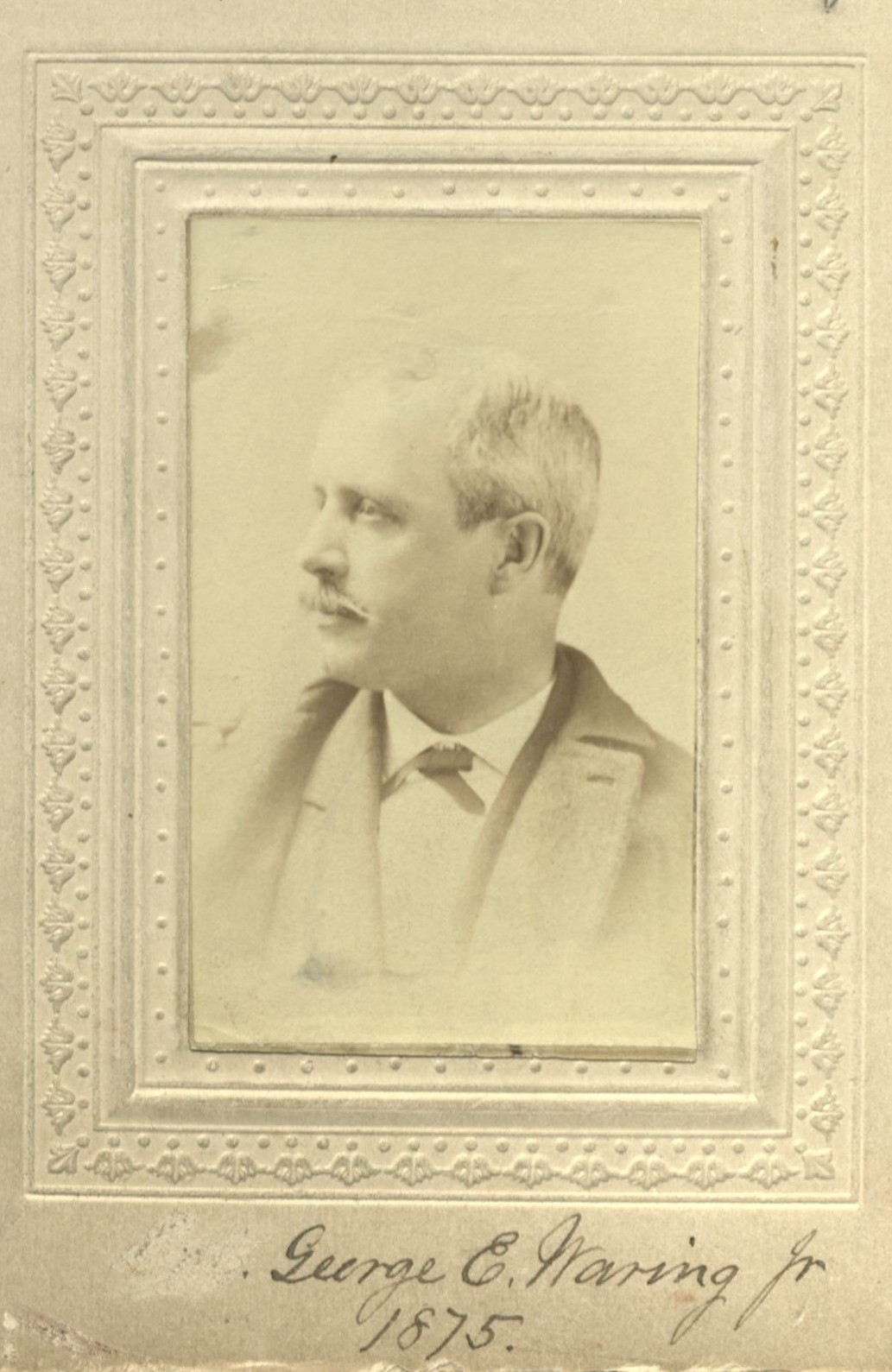Sanitary Engineer
Centurion, 1875–1898
Born 4 July 1833 in Pound Ridge, New York
Died 29 October 1898 in New York (Manhattan), New York
Buried Woodland Cemetery , Stamford, Connecticut
, Stamford, Connecticut
Proposed by Frederick Law Olmsted and Francis A. Stout
Elected 6 March 1875 at age forty-one
Proposer of:
Seconder of:
- James Copper Bayles
- Charles Fairchild
- Charles Follen McKim
- John G. Milburn
- John Charles Olmsted
- Joseph G. Rosengarten
Supporter of:
Century Memorial
It is seldom that the death of anyone in civil life is felt to be such a public calamity, affecting the dearest interests of a whole community, as was that of Colonel George E. Waring, Jr., who died at his post of duty in as heroic an act of sacrifice as service on the battlefield. His life had been full of stirring incidents, and was marked by signal achievements from its opening to its close. Those who knew him well realized the qualities and capacities that entitled him to distinction, but it was only in his later years that the golden opportunity was afforded him for distinction, which he had long waited for and which he in a measure created by his genius, his specialized learning, his wonderful enthusiasm and his indefatigable energy.
For over forty years, interrupted by three years of honorable and distinguished service in the Army, he had been a teacher of sanitary science, impressing upon the public by his work and by his innumerable contributions to the literature of sanitary drainage and kindred topics, in the form of books, magazine articles and lectures, that a great part of the disease, and misery and death that desolate our cities, and lay waste our homes and smite the land, from time to time, with panic and pestilence are preventable. He was foremost among the few expert agricultural chemists in the country, and at the early age of twenty-four was the drainage engineer of Central Park, which is a monument to his skill. He furnished a large part of the statistical information relating to sanitary problems to the Tenth Census, and nearly every large city in the country is indebted to him for such immunity as it enjoys from zymotic disease; and the freedom of the southern country from yellow fever epidemics, since the terrible visitation of that scourge to Memphis in 1878, is due to his studious discoveries and remedial work in association with the sufferings of that fearful time.
His great work at the head of the Department of Street Cleaning in this city will never be forgotten,—the universal tribute of the gratitude of our citizens of all classes to him as a public benefactor is a sufficient monument to any man. Where every one had failed before, by methods as simple as they were sound, yet stamped with originality, he created a system out of chaos and converted a mob of indolent individuals into an effective service. Having complete faith in himself, outspoken and fearless as a knight of old, he was not sensitive to ridicule or detraction, but rather enjoyed attacks which results were constantly nullifying, and which gave him frequent opportunities to employ his signal capacity for retort, and he never came out second best in any verbal or written engagement with an adversary. At last he saw surprise and distrust turn to satisfaction, confidence and pride—he had demonstrated the possibility of cleaning the streets of New York and keeping them clean, and thus incalculably promoted the comfort and safety of living.
He was a versatile writer, and his contributions to the literature of the day, outside of his specialties, would have been sufficient to establish his reputation had he done nought else.
It was a tragic fate that cut short his career at the moment when his knowledge and experience were to be of such service to the nation in stamping out a disease that is a terror to the civilized world. But the sacrifice he made will not have been in vain if it inspires by his example those who succeed him.
He was the cheeriest mortal that ever drew the breath of life, the personification of manly vigor and beauty, abounding in health, kindliness and loyalty to his ideals and his friends. All noblest, manliest amiabilities, an affluence of them met in him, and the world can never be the same to those who knew and loved him now that he has gone from them.
Henry E. Howland
1899 Century Association Yearbook

